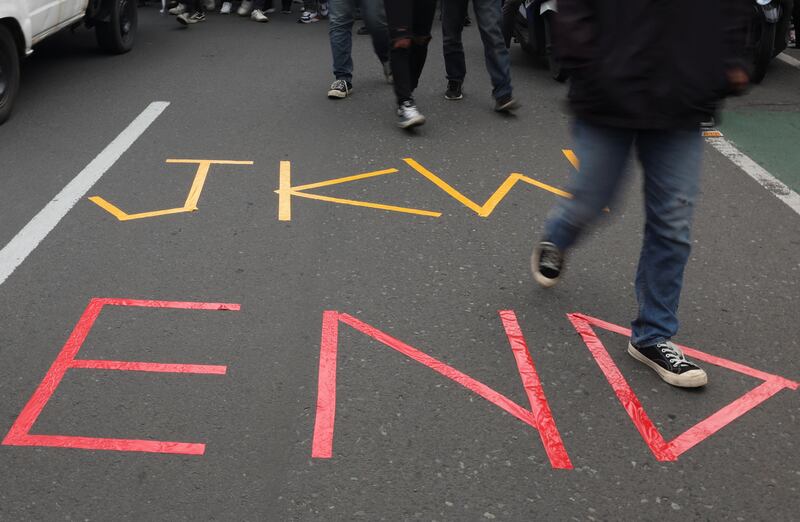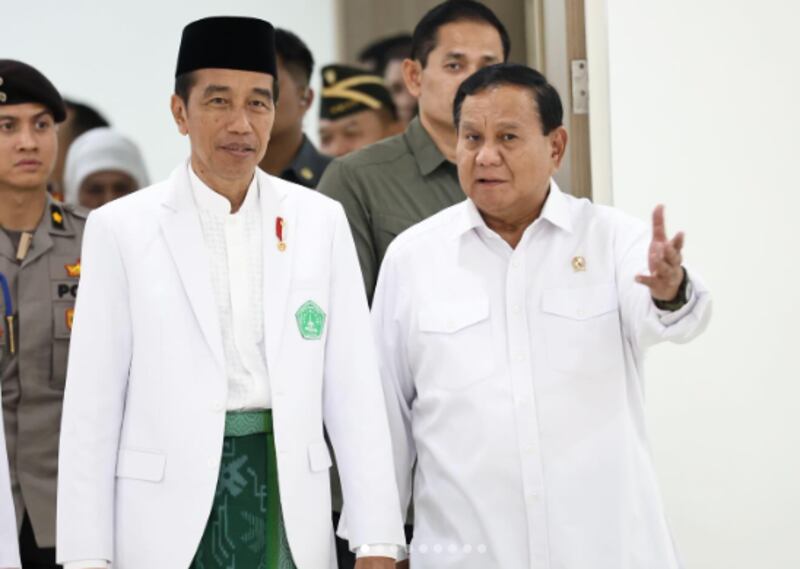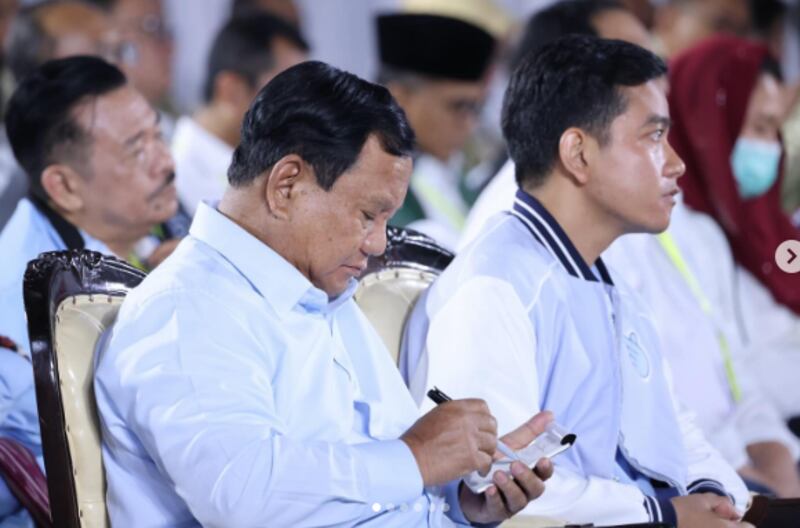Updated at 12:05 p.m. EDT on 2024-02-13
With only a week left until voters in Indonesia head to the polls to elect his successor, President Joko “Jokowi” Widodo is facing a political storm over allegations of meddling with the vote in this young democracy.
On Wednesday, hundreds of students gathered in Jakarta to denounce the president’s “intervention” in the electoral process, as more universities joined a chorus of academia urging him to stay true to democratic values.
Jokowi's attempt to mollify them and other critics a day earlier by saying he wouldn't interfere in the vote may not have been convincing. He had caused a furor last month by saying he was allowed to pick sides for the Feb. 14 election.
The election so far may not be tainted by the violent clashes and sectarian rhetoric that marked the last two, but it's a race marred by controversies over partisanship, eligibility and ethical breaches.
To draw attention to the allegedly undemocratic developments, scores of university students marched from Trisakti University to the State Palace in the capital on Wednesday afternoon.
They held banners that read “Jokowi is deceitful,” and “Reject the unfair election,” local media and news agency Reuters reported.
“We are done with the president’s intervention in the 2024 election especially to help a human rights criminal win the election,” Tegar Afriansyah, who organized the protest, told Reuters.
He was referring to one of the three presidential candidates, Prabowo Subianto, who is also defense minister. Jokowi is ineligible for a third five-year term because of constitutional limits.
Prabowo is widely accused of grave human rights violations under the regime of former dictator Suharto, although he has never been tried in court.
In addition to voting for a new president, citizens of Southeast Asia’s largest nation will be electing hundreds of officials for the national and provincial legislatures, as well as regency and city posts.

Prabowo’s running mate is Jokowi’s eldest son, Gibran Rakabuming Raka, 36, whose path to the contest was cleared by a highly controversial court decision in October.
This alliance has raised concerns among some Indonesians about dynastic politics and nepotism.
Critics, including faculty members from more than a dozen universities across the country, have accused Jokowi of straying from democratic principles and attempting to create a political dynasty by advancing his relatives.
“Our country has lost its way because of unethical and deceitful power struggles,” Harkristuti Harkrisnowo, a professor at the University of Indonesia, told a press conference in West Java last week, The Jakarta Post reported.
Earlier, Gadjah Mada University, Jokowi’s own alma mater in Yogyakarta, in a statement accused the president of “deviating” from democratic values.
Gibran, the mayor of Solo, has benefited from a controversial ruling by the Constitutional Court in October, which revised the minimum age for presidential and vice-presidential candidates from 40 to any age for those who have served as regional heads.
The court’s chief justice, Anwar Usman, who is married to Jokowi’s sister, was dismissed from his post in November by ethical violations linked to the ruling.
Although Jokowi has not officially endorsed any candidates, it is generally viewed that he will favor Prabowo and his son, Gibran. Jokowi defeated Prabowo in the last two elections in 2019 and 2014.
Ari Dwipayana, who coordinates Jokowi’s presidential staff, last week accused the president’s political enemies of orchestrating the wave of criticism against Jokowi, according to an article by Tempo.
“The strategy of partisan politics is allowed in political contestation,” Ari said.
Responding to the criticism, Jokowi said it was everyone’s democratic right to speak out, Kompas, another Indonesian news outlet, quoted him as saying.
“Yes, that is democracy, everyone is allowed to speak and express their opinions. Please do so,” Jokowi said.
Recent opinion polls show Prabowo leading the three-way race for the top job by a wide margin.
The latest survey, released Wednesday by Populi Center, found that 52.5% of the respondents favored Prabowo, followed by 22.1% for former Jakarta Gov. Anies Baswedan, and 16.9% for former Central Java Gov. Ganjar Pranowo.
The winning ticket would need to secure more than 50% of the national vote and 20% of the vote in half the provinces to avoid a runoff on June 26. The runoff would only require a candidate to secure more than 50% of the vote.
Populi Center said that the Prabowo-Gibran pair has managed to attract young voters who are looking for a fresh and dynamic leadership, as well as older voters who are loyal to Prabowo and Jokowi.

Prabowo’s popularity has been boosted by his campaign portrayal as a likable and relatable figure, using TikTok to attract young voters with humorous and fun content. Additionally, backing from groups such as the influential Muslim organization Nahdlatul Ulama has also helped, said Mada Sukmajati, a lecturer at Gadjah Mada University.
Nahdlatul Ulama has not formally said it backs Prabowo, but its leaders have voiced support for him.
“There’s also the use of state officials and resources, from ministers to village heads, to support his campaign, thanks to Jokowi’s intervention,” Mada told BenarNews.
Jokowi has also been accused of using populist measures, such as early handing out of social aid early, raising salaries for civil servants, police and the military, which critics say are aimed at boosting Prabowo’s chances.
One student at Wednesday’s march said people could see through such actions.
“If Jokowi dares to distribute social assistance and even says that a president can campaign, it means he has committed many violations. Jokowi is embarrassing us because he thinks people are stupid,” Kevin, a Trisakti University student, was quoted as saying in a report by local news magazine Tempo

Foul play at campaign events?
Allegations of irregularities in the upcoming polls rose on Monday, with the election ethics council reprimanding the General Election Commission for not changing age requirement rules before registering Gibran as a VP candidate. Though the rebuke did not affect Gibran’s eligibility, it added to the scandal surrounding his candidacy.
The election commission’s chief, Hasyim Asy’ari, was also found guilty of another election-related ethics breach last year for travelling with a politician whose party was subject to a verification process for eligibility to participate in the election.
Meanwhile, the campaign has also been tainted by allegations of foul play, such as Ganjar’s supporters being restrained by security officers during rallies, and their posters being taken down by authorities.
Anies faced an electricity blackout just as he was about to hold a rally in Madura, East Java, on Jan. 31 and was also forced to move campaign events several times after permits to use venues were withdrawn at the last minute.
Anies has criticized Jokowi’s handling of the economy, citing growing inequality and unemployment, and promised to improve public services, education and health.
He has also pledged to uphold the principles of pluralism, tolerance, and democracy, which they claim have been eroded under Jokowi’s rule
Ganjar has positioned himself as the moderate and progressive alternative, focusing on their achievements in governance, anti-corruption, and human rights.
Analysts said this year’s election poses a new challenge for Indonesia’s democracy, as it tests its institutions and the maturity of its political actors.
“The ethical violations have caused a serious erosion of democracy,” said Siti Zuhro, a researcher at the National Research and Innovation Agency (BRIN), in a discussion on Wednesday titled “Democracy on the Edge.”
Firman Noor, another political analyst, warned that the breaches and abuse of power could undermine the fairness and integrity of the elections.
“I’m afraid the (election) outcome would be invalid,” Firman said, meaning someone could challenge the result because of the ethical breaches.
“The government must follow the law, not twist it, and not create dynasties or let oligarchy take over.”
This story has been updated to correct the list of representatives being elected.
